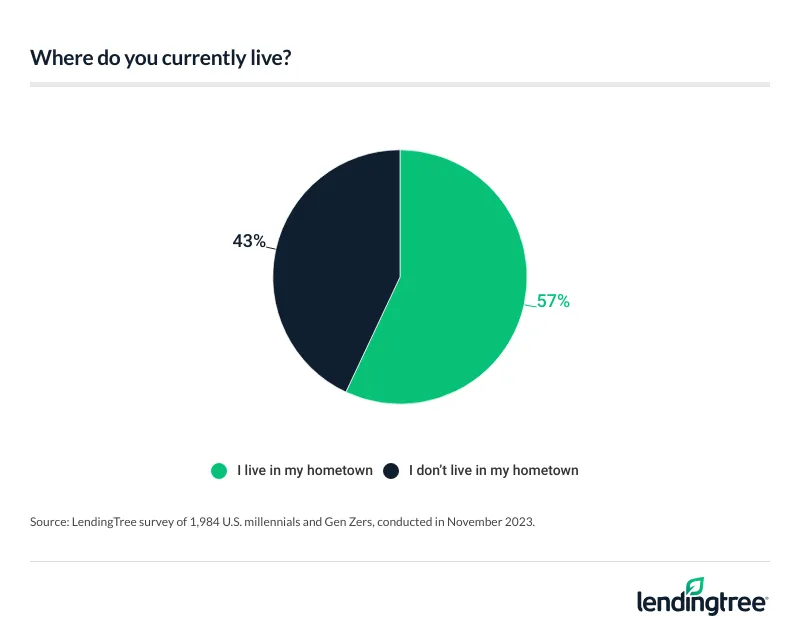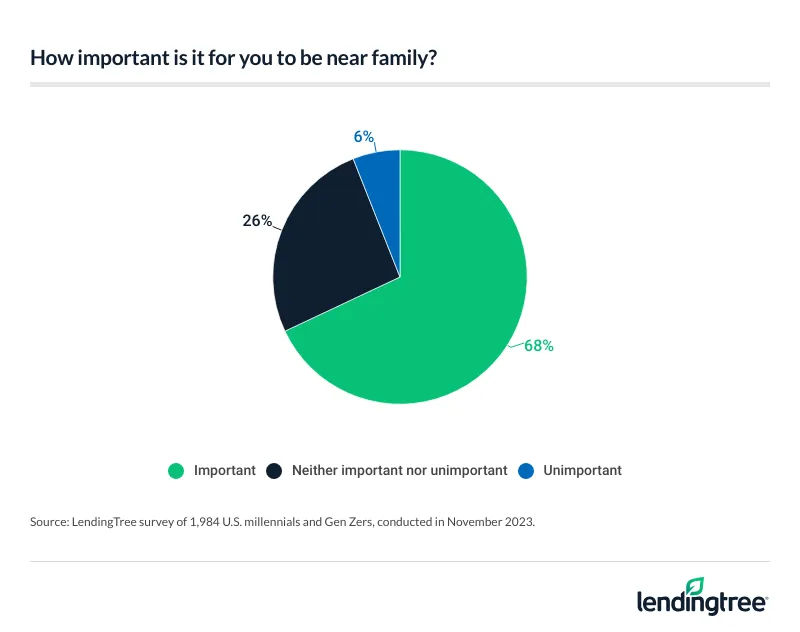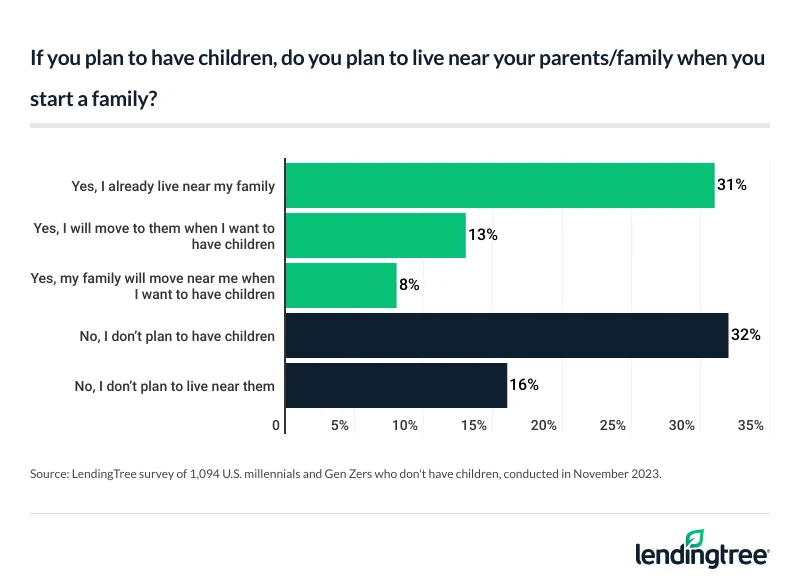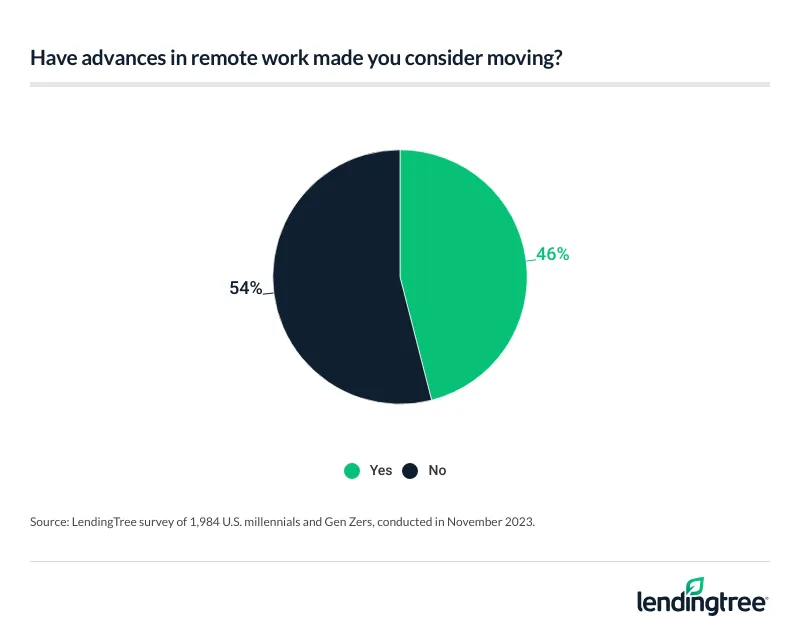57% of Young Americans Live in Their Hometowns, but 47% Who Don’t Would Consider Moving Back
As the expression goes, home is where the heart is, and most young Americans are taking that, well, to heart.
The latest LendingTree survey of nearly 2,000 U.S. millennials and Gen Zers found 57% live in their hometowns. We also found that 62% of young Americans live near their parents, including those who don’t live where they grew up.
Here’s a deeper look at the numbers — and the whys behind them.
Key findings
- Many young Americans are blooming where they were planted. 57% of millennials and Gen Zers live in their hometowns, while another 16% live near their parents but outside their hometowns. Notably, men are 28% more likely to live in their hometowns than women (64% versus 50%). Among those who didn’t leave home, 42% felt obligated to stay near family, 36% stayed out of convenience and 33% couldn’t afford to move.
- For some, family comes first. 68% of young Americans say it’s important for them to be near family, with Gen Zers (71%) agreeing more than millennials (67%). Among those who say it’s important, 60% simply enjoy being close by, while 13% care for aging parents and 12% enjoy the sense of community. Beyond being close to their family, 41% of young Americans live close to their significant other’s parents.
- Among young parents, built-in child care is a plus. 73% of millennial and Gen Z parents of children younger than 18 say it’s important for them to be near family, with 21% citing child care support as their top reason. Those without kids still have child care in mind, as 52% plan to live near their parents or family when they have a child.
- Remote work has brought new possibilities to many young Americans’ living situations. Almost half (46%) of young Americans say remote work has made them consider moving. Separately, 47% of respondents who don’t live in their hometowns would consider moving back. When asked why they moved away, 36% wanted to try something new, 29% sought economic opportunities and 29% moved for a significant other.
Home sweet hometown: Majority of young Americans live in their hometowns
More than half (57%) of Americans ages 18 to 42 live where they grew up. An even greater percentage live near their parents (62%), including those who live outside their hometowns.

Here’s the complete breakdown from our findings:
- 46% live in their hometowns near their parents
- 24% don’t live in their hometowns and aren’t near their parents
- 16% don’t live in their hometowns but are near their parents
- 8% live in their hometowns but not near their parents
- 3% don’t live in their hometowns and don’t have parents
- 3% live in their hometowns and don’t have parents
“Making ends meet in today’s economy can be tough for anyone, but it’s often especially challenging for young people,” LendingTree senior economist Jacob Channel says.
Elevated home prices, high mortgage interest rates and inflation — effects of the COVID-19 pandemic — impact younger generations especially. According to an August 2022 LendingTree survey on post-pandemic living arrangements, two-thirds of young adults who moved back home during the crisis still lived with their parents.
“The younger you are, the less likely you are to have a significant amount of savings or a high-paying job,” Channel says. “From a financial perspective, living on your own without relying on your parents for help is harder than it was just a few short years ago.”
Staying close to Mom and Dad provides a layer of support to young people, even if they’re not getting direct financial help from their parents.
Men more likely to live in their hometowns than women
Men are 28% more likely to live in their hometowns than women — 64% versus 50%. And they’re more likely to live near their parents, whether in or outside their hometowns — 68% versus 58%.
Gen Zers (ages 18 to 26) are more likely to live in their hometowns than millennials (ages 27 to 42) — 64% versus 53%. In addition, as expected because of their younger ages, a higher percentage of Gen Zers live near their parents, including those that live outside their hometowns — 70%, versus 59% of millennials.
Why millennials and Gen Zers stay close to home
When asked why they remained close to their hometowns, 42% of respondents cited a sense of obligation to stay close to family.
Why millennials and Gen Zers live close to their hometowns
| Feel obligated to stay close to family | 42% |
| Convenience | 36% |
| Friends | 33% |
| Can’t afford to move | 33% |
| Don’t want to leave | 29% |
| Career | 19% |
| School | 15% |
| Weather | 14% |
| Other | 6% |
68% of young Americans value living near family
Living close to family is a top priority for younger adults — 68% of respondents say it’s important to them. Men agree slightly more than women (69% versus 67%), and more Gen Zers (71%) say it’s essential than millennials (67%).
Higher-earning individuals are more likely to say living near family is important — 74% of respondents with household incomes of $100,000 or more annually say they value it, versus 64% of those earning less than $35,000.
When asked why living near family is important, 60% say they enjoy being close by. Other reasons include caring for aging parents (13%) and having a sense of community (12%).

The high percentage of millennials and Gen Zers wanting to be close to family could be another byproduct of the pandemic.
“The lockdowns during the pandemic probably brought many families closer together, as they were able to spend more time with one another than they otherwise could have,” Channel says. “Even if they lived elsewhere before, realizing how much they liked being near their family may have resulted in more people opting to move closer to their parents.”
These moves may play a role in the current housing market, marked by low inventory and heightened home prices.
“More people living in a given area can put upward pressure on housing costs,” Channel says.
“In less urban parts of the country, supply shortages can be very noticeable,” he adds. “Builders are often less likely to invest in more rural areas. It’s harder for towns to keep up with extra housing demand from new buyers, like grown children setting off on their own.”
Many young Americans also live close to their partner’s parents
About 4 in 10 (41%) millennials and Gen Zers live near their partner’s family.
In particular, higher-income earners are more likely to live close to their partner’s parents — 55% of those with household incomes of $100,000 or more and 51% making $75,000 to $99,999, compared with 31% of those earning less than $35,000.
Nearly 6 in 10 (58%) respondents with a partner live closer to their parents than their significant other’s parents, with more men (61%) saying this is the case than women (56%).
For parents of young kids, it takes a village
While being close to family is a priority for 68% of millennials and Gen Zers, it’s of even greater value for those with kids. Nearly three-fourths (73%) of young parents with children younger than 18 say it’s important to be near family, versus 65% of nonparents.
Of the parents that say being close to family is important, 21% say help with child care is the most important reason.
The average annual cost for child care in the U.S. is about $11,800, although it’s significantly higher in several states. Families who pay for child care spend an average of about 18% of their income on it.
“People often spend hundreds of dollars a week on child care, a cost that could shrink significantly if your parents are watching your kids,” Channel says.
Young families fortunate enough to get help from grandparents or extended family members can reallocate the savings to housing costs, paying debts and other expenses.
Meanwhile, millennials and Gen Zers who don’t have kids are thinking ahead about child care. More than half (52%) say they’ll live close to family when they have children, with 31% already living near their parents and 21% saying either they or their parents will move.

Remote work could encourage young Americans to move
The rise of remote employment has given young Americans more flexibility with where they reside. In fact, 46% of millennials and Gen Zers say remote work has made them consider relocating.
The percentage is higher in some groups. Individuals with household incomes of $100,000 or more (58%), those making between $75,000 and $99,999 (52%) and parents with children younger than 18 (51%) say remote work has made them contemplate a move.

“One of the biggest benefits of remote work is that you can leverage it to live in more places than you could if you had to go to the office every day,” Channel says. “For example, you might be able to keep a high-paying job in a big city while you live in a cheaper area.”
However, Channel warns that “leveraging your ability to work remotely to relocate isn’t without drawbacks.” An end to your company’s remote work policy could result in a painful commute, a move or even having to find a new job.
47% of young Americans who live outside their hometowns would consider moving back
Many millennials and Gen Zers who don’t live in their hometowns say they would consider returning — 47%. Gen Zers are more likely to return than millennials (51% versus 46%), as are men than women (55% versus 42%).
When asked why they moved away from their hometowns, the top reason was to try something new.
Why millennials and Gen Zers left their hometowns
| Wanted to try something new | 36% |
| Spouse/partner/significant other | 29% |
| Pursue economic opportunities | 29% |
| School | 21% |
| Wanted distance from family | 17% |
| Weather | 7% |
| Other | 18% |
Making the big move: Tips to consider
There’s no place like home, but moving back isn’t as simple as closing your eyes and clicking your heels together three times.
“If you want to move back to your hometown or closer to your parents, you should be sure you’re making a decision that’ll benefit you financially and emotionally,” Channel says.
Here are some things to think about:
- Know the cost of living in your hometown. You may be familiar with some aspects of life in your hometown, but you’ll want to do your homework if you haven’t lived there since childhood. “Even if you’re from a small town, the cost of living might not be much better than where you’re living,” Channel says. Look up the typical costs for housing, food, transportation, utilities, taxes and other basics as you would any new area.
- Make sure your employment situation is stable. “Don’t rush to move closer to your parents if doing so will leave you without a job,” Channel says. Even if you’re secure in your job, familiarize yourself with the job market in your hometown and surrounding areas should you need to make a future change.
- Research the housing market. “Even small towns can be extremely expensive,” Channel says. “If you’re moving closer to home to save money on housing costs, you might be in for a rude awakening.”
- Be realistic about moving costs. Avoid depleting your savings to move, Channel says. “Even if you’re moving to a relatively cheap area, moving costs can still add up,” he says. If you’re not prepared to potentially spend thousands of dollars to haul your stuff back to your hometown, you could end up in a bind.
- Consider the emotional impact of returning to your hometown. “Outside of finances, you should also think about what moving back to your hometown will do for your mental health,” Channel says. “Living close to Mom and Dad can be nice, but it can be hard, for example, to sacrifice the amenities of big-city living for a town-and-country lifestyle. Even if living in your hometown will save you money, those savings might not be worth it if your new location makes you miserable.”
- Make sure you’ve thought it through. “Ultimately, while moving closer to your parents can come with numerous upsides, it doesn’t always work out the way people envision,” Channel says. “Moving back to your hometown can be expensive, and the perks of a lower cost of living (assuming your hometown has a lower cost of living) can be offset by a weak jobs market and lower wages. On top of that, being overly dependent on your family can strain your relationship with them.”
Methodology
LendingTree commissioned QuestionPro to conduct an online survey of 1,984 Gen Zers and millennials ages 18 to 42 from Nov. 16 to 20, 2023. The survey was administered using a nonprobability-based sample, and quotas were used to ensure the sample base represented the overall population. Researchers reviewed all responses for quality control.
We defined generations as the following ages in 2023:
- Generation Z: 18 to 26
- Millennial: 27 to 42
View mortgage loan offers from up to 5 lenders in minutes

